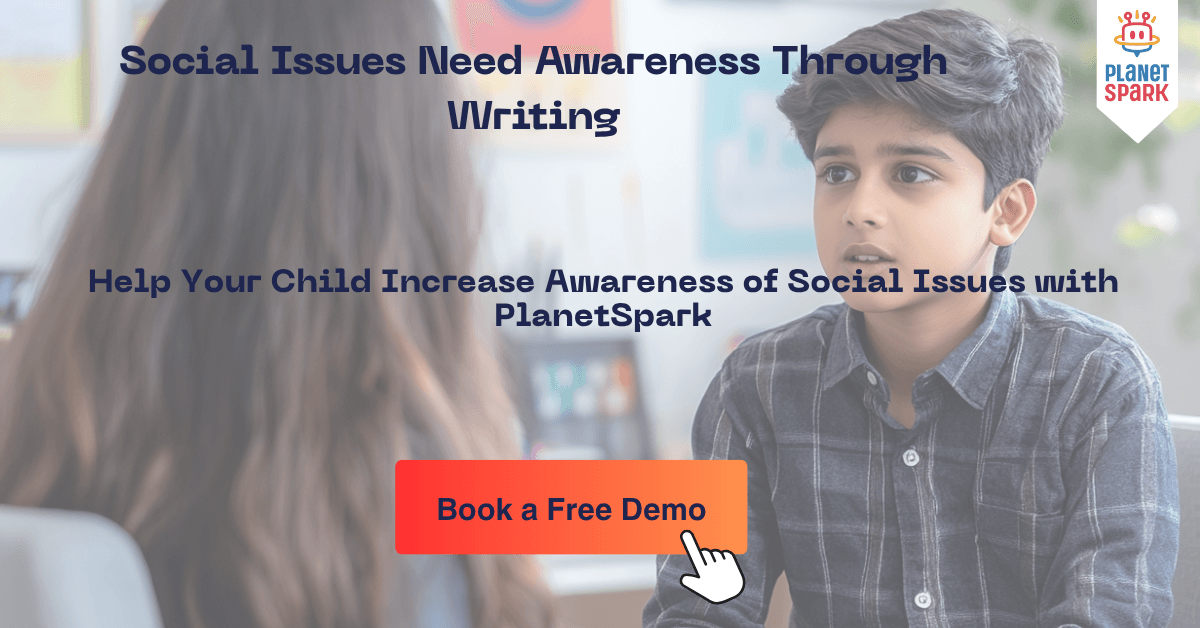Bullying in Indian Schools: Prevention & Writing Support
Last Updated At: 20 Jul 2025
11 min read

Bullying in schools is a widespread concern that can leave lasting impacts on a child’s emotional, social, and academic well-being. From anxiety and low self-esteem to aggressive behavior and withdrawal, the effects are real and often lifelong. Fortunately, schools can play a transformative role in preventing bullying and creating a safe space where children thrive.
One of the most effective long-term solutions to combat bullying is to equip children with strong communication, emotional expression, and confidence-building skills. This is where platforms like PlanetSpark’s Creative Writing Course for Kids come in. Designed for learners aged 6 to 14, PlanetSpark’s program helps children express themselves more clearly, build imaginative thinking, and develop empathy through storytelling and structured writing. With live 1:1 guidance from expert educators, the course strengthens both writing and social-emotional skills, empowering children to stand up against bullying and contribute positively to their communities.
In this blog, we explore the most effective strategies schools can adopt to stop bullying, support both victims and perpetrators, and promote inclusive behavior.
What is Bullying in Schools?
Bullying refers to unwanted aggressive behavior among school-aged children that involves a real or perceived power imbalance. It can be physical, verbal, emotional, or even cyber-based. In Indian schools, bullying often goes unnoticed or underreported due to a lack of awareness, cultural silence, or institutional neglect.
Through creative expression, children can better articulate when they’re hurt or witnessing injustice, something PlanetSpark’s writing program nurtures deeply. See for yourself with a free trial session.
Common Forms of Bullying in Schools
Physical bullying: Hitting, pushing, or other forms of physical aggression.
Verbal bullying: Teasing, name-calling, and threats.
Social exclusion: Ignoring or excluding someone from group activities.
Cyberbullying: Online harassment via social media, messages, or email.
Discriminatory bullying: Targeting based on caste, religion, language, gender, or appearance
Why Do Children Bully?
Understanding the root causes can help prevent bullying behavior. Common reasons include:
Lack of empathy and poor emotional regulation
Desire to dominate or gain social status
Learned behavior from home or media
Insecurity or previous trauma
Peer pressure or toxic group dynamics
Effects of Bullying on Children
Bullying doesn't just hurt in the moment. Its effects can linger and shape a child’s development for years. Some major consequences include:
Low self-confidence and poor academic performance
Depression, anxiety, and suicidal thoughts
Social isolation and withdrawal
Increased aggression or bullying of others
Long-term emotional trauma
Why Is It Crucial for Schools to Address Bullying?
Schools are not just academic institutions—they're second homes for children. A hostile school environment caused by bullying can:
Lower academic performance
Affect emotional well-being
Damage social skills
Lead to school avoidance or dropouts.
Thus, creating a safe and supportive school culture is essential for every student’s growth.

Why Indian Schools Struggle with Bullying
Despite these efforts, many schools still fall short due to:
Lack of trained counsellors in most Indian schools
Cultural barriers around reporting abuse
Minimal inclusion of SEL (Social and Emotional Learning) in the curriculum
Peer pressure and normalization of toxic behaviors
Teachers are unaware of the signs of bullying.
PlanetSpark’s writing course allows children to express pent-up emotions and rebuild confidence in a safe and creative space. Take a free trial class to learn how.
Strategies to Prevent and Reduce Bullying
Here are practical steps schools, parents, and educators can take:
1. Establish a Clear Anti-Bullying Policy
Schools should implement well-defined, zero-tolerance policies that include:
Anonymous complaint systems
Swift disciplinary action
Annual audits and policy revisions
2. Incorporate Social and Emotional Learning (SEL)
Research from NCERT and UNESCO supports the integration of SEL programs in Indian classrooms. SEL helps students:
Build empathy
Manage emotions
Make responsible decisions
3. Empower Students Through Communication Programs
Creative writing, public speaking, and theatre activities can help children articulate their emotions and speak up confidently.
PlanetSpark’s Creative Writing Course, for example, helps children develop storytelling skills that improve both academic performance and emotional intelligence.
4. Teacher Training and Awareness
Teachers must be trained to:
Recognize the signs of bullying.
Intervene appropriately
Create safe classroom environments.
CBSE has recently made it mandatory for teachers to undergo regular training under the “Safe and Secure School Environment Framework.”
5. Involve Parents in the Dialogue
Parent-teacher meetings should address:
Emotional well-being of students
Digital behavior and cyberbullying red flags
Community-building events that foster inclusivity
Creative writing nurtures self-expression and helps students form healthier emotional habits, skills that PlanetSpark’s program focuses on. Take a free trial session to understand how it is taught.
Role of Technology in Tackling Bullying
AI-powered monitoring tools, anonymous reporting apps, and online counseling are increasingly being adopted in Indian schools.
Apps like Buddy4Study and YourDOST are helping students access mental health support.
CBSE-affiliated schools are encouraged to set up Student Safety Committees under the POCSO Act compliance model.
6 Effective Ways Schools Can Stop Bullying
1. Creating a Safe and Inclusive Environment
The foundation of bullying prevention is to foster a culture of safety and respect. Schools should:
Establish a zero-tolerance policy toward bullying.
Designate staff members as go-to contacts for reporting incidents.
Encourage open communication between students, teachers, and parents.
Promote inclusivity through classroom discussions and team-building activities
2. Raising Awareness About Bullying
Awareness is prevention. Schools must:
Conduct regular anti-bullying workshops.
Integrate bullying education into the curriculum.
Host student-led campaigns that foster unity and empathy
Teach students how to identify, respond to, and report bullying
3. Empowering Teachers as First Responders
Teachers are on the front lines and must be:
Trained to recognize signs of bullying
Encouraged to intervene immediately and support victims
Approachable and empathetic to students
Involved in restorative practices that help both bullies and victims heal
4. Counseling and Supporting Parents
Parents are critical allies in addressing bullying. Schools should:
Hold regular parent counseling sessions.
Provide guidelines on bullying detection and response.
Encourage documentation and reporting of behavioral changes at home.
Educate parents of bullies to understand the impact of their child’s behavior
5. Implementing Digital Safety and Anti-Cyberbullying Programs
In today's tech-savvy world, schools must also:
Educate students about online safety and responsible digital behavior.
Provide channels to report cyberbullying anonymously.
Work with parents to monitor screen time and internet use.
Collaborate with law enforcement if threats are serious or persistent
6. Providing Professional Counseling Support
Some students, both victims and bullies, may need psychological support. Schools can:
Hire or partner with licensed counselors
Organize group therapy sessions.
Build healing and rehabilitation programs for affected students

The State of Bullying in Indian Schools
According to a survey conducted by the NGO CRY (Child Rights and You), around 42% of Indian students have faced bullying in schools. Another NCERT report revealed that about 60% of students in classes 6-12 experienced bullying at least once in the academic year.
In many schools, bullying is seen as a “rite of passage” or brushed off as harmless fun. However, these repeated patterns of aggression severely affect a child’s sense of security and self-worth.
How Schools in India Can Prevent and Reduce Bullying
Here are researched and proven ways that schools across India can implement to tackle bullying effectively:
1. Establish Anti-Bullying Policies
Schools should draft clear anti-bullying guidelines, in line with recommendations from CBSE and NCERT, which include complaint mechanisms, disciplinary actions, and support for victims.
2. Form Anti-Bullying Committees
As per CBSE’s 2015 directive, all affiliated schools are required to form Anti-Bullying Committees comprising the principal, teachers, parents, and student representatives.
3. Promote Open Communication
Create a school culture where children feel safe reporting bullying. Anonymous drop-boxes, dedicated helplines, and regular student feedback forms can help.
4. Integrate Life Skills and SEL (Social Emotional Learning)
Schools should incorporate empathy-building, communication, and emotional intelligence activities as part of their curriculum. Creative writing programs, dramatics, and storytelling classes foster expressive and empathetic children.
5. Train Teachers and Staff
Workshops on identifying and addressing bullying behavior are essential. Teachers should be trained to respond quickly and sensitively when they witness or hear about bullying.
6. Engage Parents
Schools must regularly update parents and conduct orientation sessions to inform them about bullying prevention strategies and warning signs.
7. Leverage Technology Responsibly
Monitor digital platforms for cyberbullying. Educate students about digital etiquette and safety. Schools should have cyber safety workshops and protocols.
8. Encourage Peer Support Systems
Buddy programs and peer mentoring help create a support network for vulnerable students. Senior students should be role models and allies against bullying.
Children trained in writing and storytelling are more likely to speak up, advocate for themselves, and support others. PlanetSpark builds these skills in every child. Take part in a free session now.
How PlanetSpark Helps Children Become Confident Communicators
Discover PlanetSpark’s Creative Writing & Public Speaking Program
PlanetSpark offers a revolutionary, tech-enabled program that transforms young minds into expressive, confident communicators through personalised 1:1 live sessions.
1:1 Personal Trainers for Every Child
Each student is matched with a certified expert who offers:
Customised guidance based on learning style and pace
Real-time feedback on writing and speaking
Focused improvement on creative writing, storytelling, grammar, and public speaking
Personalised Curriculum and Learning Roadmap
Starts with a skill assessment
Creates a unique roadmap for grammar, fluency, creativity, and more
Updated regularly based on progress and feedback
SparkX – AI Video Analysis
Students upload their stories and speeches.
AI assesses voice, grammar, stage presence, and delivery.
Detailed reports highlight growth areas.
AI-Led Practice & Digital Journaling with Spark Diary
Independent speech/story practice via AI
Write stories, poems, and reflections in their own Spark Diary.
Builds strong daily writing habits
Gamified Learning & Engaging Quizzes
Spell Knockout, Grammar Guru, Word Wisdom, and more
Helps students learn through fun, interactive games
Exclusive Clubs & Talent Showcases
Join creative writing, speech, podcasting, or debate clubs.
Participate in live competitions, open mics, and online showcases
Transparent PTMs and Comprehensive Reports
Regular performance updates with action plans
Real-time feedback ensures consistent development.
Safe Sharing with Sparkline & eBooks via SparkShop
Share writing and stories on a safe, moderated social platform.
Access eBooks for extra reading and practice anytime
Final Thoughts
Bullying is not “just a part of growing up.” It’s a damaging behavior that can shape a child’s future. Schools must adopt a proactive, compassionate, and collaborative approach to eliminate bullying from the inside out.
Empowering children with confidence, communication, and emotional intelligence is the ultimate weapon against bullying, and this is where PlanetSpark’s Creative Writing and Communication Program plays a critical role.
PlanetSpark’s 1:1 live Creative Writing and Communication Programs are a great place to start nurturing these values. Join a free trial class to learn how.
Frequently Asked Questions (FAQs)
1. Is bullying common in Indian schools?
Yes. According to multiple surveys, over 40% of students in Indian schools have experienced bullying at some point. It is most prevalent during middle and high school years, and it often goes unreported due to fear or lack of awareness.
2. What actions are Indian schools taking to prevent bullying?
While India lacks a dedicated anti-bullying law, CBSE has mandated the formation of Anti-Bullying Committees and encourages the involvement of counselors, teachers, and parents in intervention strategies. Schools are increasingly adopting awareness programs, peer mentoring, and workshops to address the issue.
3. How can parents identify if their child is being bullied?
Be alert to signs such as reluctance to go to school, drop in academic performance, unexplained bruises, emotional outbursts, or social withdrawal. Open communication and regular emotional check-ins are essential.
4. Can bullying be reported to legal authorities in India?
Yes. If bullying escalates into physical abuse, cyber harassment, or threats, it can be reported to the police under provisions of the Indian Penal Code. Maintaining documentation, like screenshots or medical reports, can support the case.
5. How can creative writing help children prevent or cope with bullying?
Creative writing helps children express thoughts, process emotions, and develop empathy. It encourages them to view situations from multiple perspectives and articulate their feelings effectively—key skills in preventing and responding to bullying situations.
6. How does PlanetSpark support children in dealing with bullying?
PlanetSpark’s Creative Writing and Public Speaking Courses focus on building strong communication skills, emotional intelligence, and confidence. These skills empower children to speak up, seek help, and develop a positive self-image—critical traits for both preventing and handling bullying.
7. Is PlanetSpark’s Creative Writing Program suitable for shy or introverted children?
Absolutely. The program offers 1:1 live coaching, gamified learning tools, and a safe, encouraging environment that helps even the most introverted children express themselves confidently, develop their creative voice, and gain social confidence.
Personalized Communication Report
Record a video to get a AI generated personalized communication report for your child
Select Learner's Class

Hi There, want to try these
tips for your child with
LIVE with our expert coach?
Let's check your child's
English fluency
